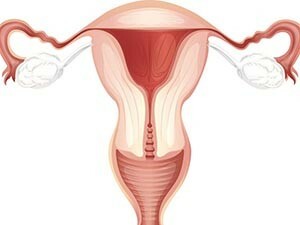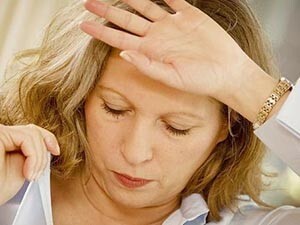After the menopause, the body develops differently, the woman still has to experience unknown sensations. Deterioration of well-being causes changes in the body with menopause. Knowing them, it is easier to control it, not to be afraid of a new period in life, to understand what it is worth to be afraid of.
Ovaries
All changes are caused by a violation of the balance of sex hormones. The substances are produced by the ovaries, because what is happening concerns them first. The glands decrease in size by about a third, the follicles cease to stand out in them, and the eggs mature.
The appearance of the ovaries is also changing. Now most of them are made up of connective tissue, causing them to become wrinkled and tuberous, the vessels of the organs are sclerosed.
Uterus and appendages
 Menopausal changes affect the fallopian tubes. The connective tissue takes up more and more space in them, the muscle layer is thinned, the mucous membrane atrophies. The folds of the inner surface of each tube are smoothed out, they lose "cilia", and the lumen of the organs becomes narrower or completely closed.
Menopausal changes affect the fallopian tubes. The connective tissue takes up more and more space in them, the muscle layer is thinned, the mucous membrane atrophies. The folds of the inner surface of each tube are smoothed out, they lose "cilia", and the lumen of the organs becomes narrower or completely closed.
The uterus in premenopause with a fluctuating hormonal background increases slightly, becoming softened. But soon the organ decreases in size due to the atrophy of its constituent muscle fibers and the replacement of their connective tissue. The inner cavity becomes narrower and shorter. Such changes cause external and visible signs of menopause:
- First change in the character of the monthly and irregular cycle;
- Then stop menstruation.
The main signs of menopause depend to a greater extent on the development of the mucous uterus. Atrophy overtakes its outer layer, and then the basal. After the final approval of menopause, there is no such separation of the endometrium.
The cervical canal narrows together with the uterus. In the late menopause, it can overgrow completely, causing fluid accumulation inside. The cervix practically ceases to produce mucus.
Vagina and external reproductive organs
Changes in the body in menopause with the uterus affect the vagina, causing one of the characteristic symptoms of the condition - a feeling of dryness. The mucous organ becomes less elastic, loses its folds, and it shortens itself. Inside, the microflora changes, which increases the likelihood of injury, infection.
External reproductive organs look different:
- Lobok and large labia lose the layer of subcutaneous fat, become more flabby;
- Hair in the intimate area is thinning;
- Small labia reduces, taking the form of skin folds;
- Mucous vulva is thinned.
Breast
Mammary glands in menopause lose their former elasticity due to a decrease in the volume of adipose tissue. It is replaced by a connecting one, and here the danger of seals and degeneration increases.
Breast size may increase due to weight gain or decrease. In the latter case, the atrophy of the mammary glands is complete, only the nipple remains visible.
Urinary organs
Serious, sometimes interfering changes in the body of a woman with menopause occur in the bladder. Weaken not only its walls due to the lack of hormonal influence, but also mucous.

Atrophic processes in the urethra play a role in this. They are similar to those that occur in the vagina, so its lumen is enlarged by reducing folds.
Endocrine glands
 And in the endocrine sphere the body functions differently:
And in the endocrine sphere the body functions differently:
- The thyroid gland enhances activity and grows in size at the initial stage of menopause. This is especially noticeable in those who have had ovariectomy. Then the iron reduces its value, reduces the production of hormones;
- The adrenal cortex is enlarged, hyperplastic processes occur in it. This is one of the causes of increased nervous excitability in menopause, blood pressure jumps and tides;
- The pancreas moderates the activity, which can cause an increase in blood sugar or insulin resistance. Physicians believe that the reason for this is the active work of the pituitary gland.
Heart and blood vessels
Alarming changes in women's menopause occur in the circulation and work of the heart. Vessels lose their elasticity due to the cessation of beneficial effects on them of hormones, their lumen is narrowed. The blood becomes more viscous, the level of cholesterol rises. All this makes possible its settling on the vascular walls. And consequently, the blood supply to the heart muscle is disturbed, there is a tachycardia. This is one of the causes of climacteric tides.
Skin and muscles
One of the painful topics for many women in the listing of climacteric changes is the loss of the appearance of the skin. The absence of hormones interferes with the processes of formation of collagen and elastin, supporting its tone. Therefore, in menopause, the number of wrinkles is growing rapidly, now not only mimic.
The skin surface is peeling, as it is deprived of sufficient food due to a decrease in the volume of progesterone. He controlled the work of the sebaceous glands, which now have tempered their activity.
Muscular tissue in all parts of the body also loses its former tone, hangs. This is especially reflected in the reproductive organs. The weakened muscles of the small pelvis do not support them so well, as a result, the uterus, the vagina, and the bladder may fall.
 We recommend reading an article about when menopause begins in women. You will learn about the stages of menopause, its symptoms, early and late menopause, the recommended way of life.
We recommend reading an article about when menopause begins in women. You will learn about the stages of menopause, its symptoms, early and late menopause, the recommended way of life.
Bones
Bone tissue, which, in order to maintain its own strength, must be constantly updated, it loses the ability to do so. Now, due to the lack of hormones, the natural process of destruction predominates over regeneration. Bones are made more fragile, porous in structure, lighter in weight.
The changes that exist in the body with menopause are natural. But when they bring inconvenience and pain, they need to be fought. It's impossible to stop the process, but it's quite possible to brake it.
